Comments
GUILTY - A federal jury on Wednesday convicted a career Los Angeles government official of 10 felonies that could send him to prison for 20 years, ending a public corruption prosecution into a City Hall bribery scheme involving billionaire real estate developers.
The verdict against Raymond She Wah Chan, the city’s former deputy mayor for economic development, was returned about 9:15 a.m. after jurors convened at 8 a.m. They deliberated about 15 minutes on Tuesday after nearly six hours of closing arguments and rebuttal.
In a press release, Martin Estrada, the U.S. attorney in Los Angeles, said Chan “used his leadership position in City Hall to favor corrupt individuals and companies willing to play dirty.”
“The residents of Los Angeles deserve much better. With today’s verdict, we send a strong message that the public will not stand for corruption and that pay-to-play politics has no place in our community,” Estrada said.
Chan, 67, left the courthouse without speaking to reporters, as did his lawyers, Michael Freedman and John Hanusz. U.S. District Judge John F. Walter allowed Chan to stay out of custody until sentencing, which is scheduled for June 10.
The fast deliberation followed a 12-day trial about an organized crime syndicate led by now-former Los Angeles City Councilman José Huizar that included key support from Chan by way of contacts with developers and bribes that he secured for Huizar and himself.
Freedman and Hanusz worked to cast Chan as a dedicated public servant being blamed for crimes committed by prosecution witnesses hoping to reduce their own time in prison, as well as by Huizar, who is to surrender for his 13-year prison sentence by April 30.
Freedman and Hanusz emphasized that Chan never had a “quid pro quo” agreement with anyone that clearly exchanged his government services for personal benefits, but prosecutors said Chan’s corruption is a simple case of a government official aiding and abetting a corrupt politician while lining his own pockets through a private consulting firm he began forming while still at City Hall.
“This is a common sense case,” Assistant U.S. Attorney Susan Har said in her rebuttal on Tuesday.
In her closing argument, Assistant U.S. Attorney Cassie Palmer said Huizar and Chan have “very different personalities,” but together, they were a “perfect package.”
“For years, he kept Huizar happy by getting him the thing he loved most: bribes,” Palmer said. She reminded jurors of steps Chan took to “avoid the feds,” which was a key goal of Huizar’s crime syndicate. One was checking under chairs for listening devices after FBI agents visited his office. Another was writing false “attorney-client privilege” claims on documents he didn’t want federal officials to see.
The jury of eight men and four women convicted Chan of one count of conspiracy to violate the federal Racketeer Influenced and Corrupt Organization Act, five counts of aiding and abetting honest services wire fraud, two counts of honest services wire fraud and two counts of aiding and abetting bribery concerning programs receiving federal funds. They also convicted him of one count of making false statements to government officials.
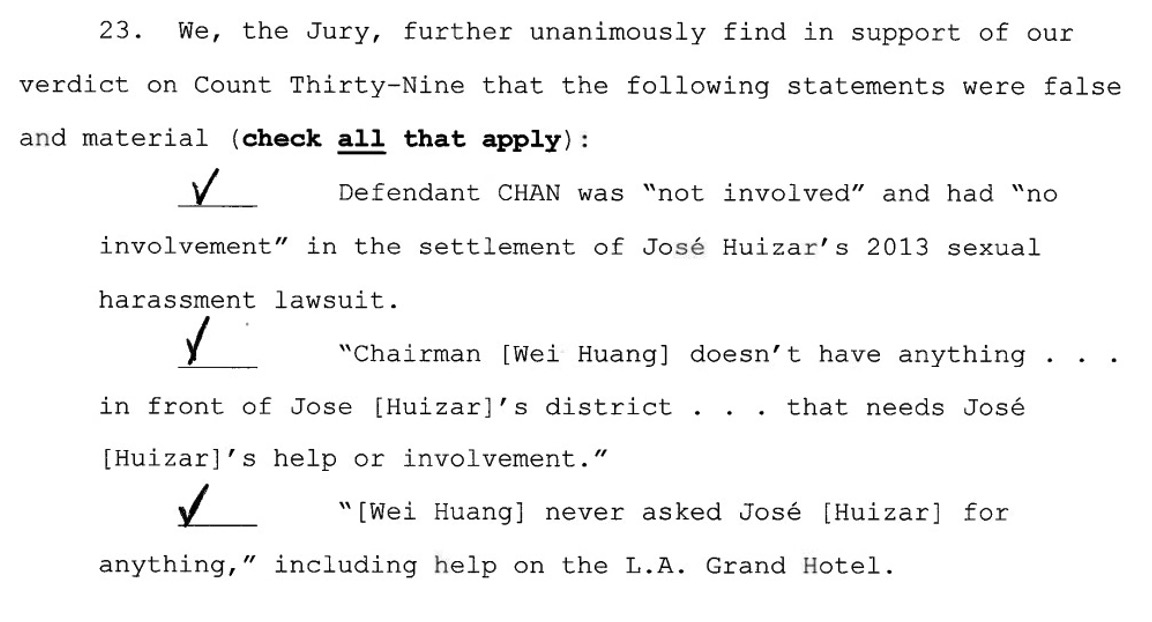
The verdict form included several options to support some counts and instructed jurors to “check all that apply.” They checked every single one.
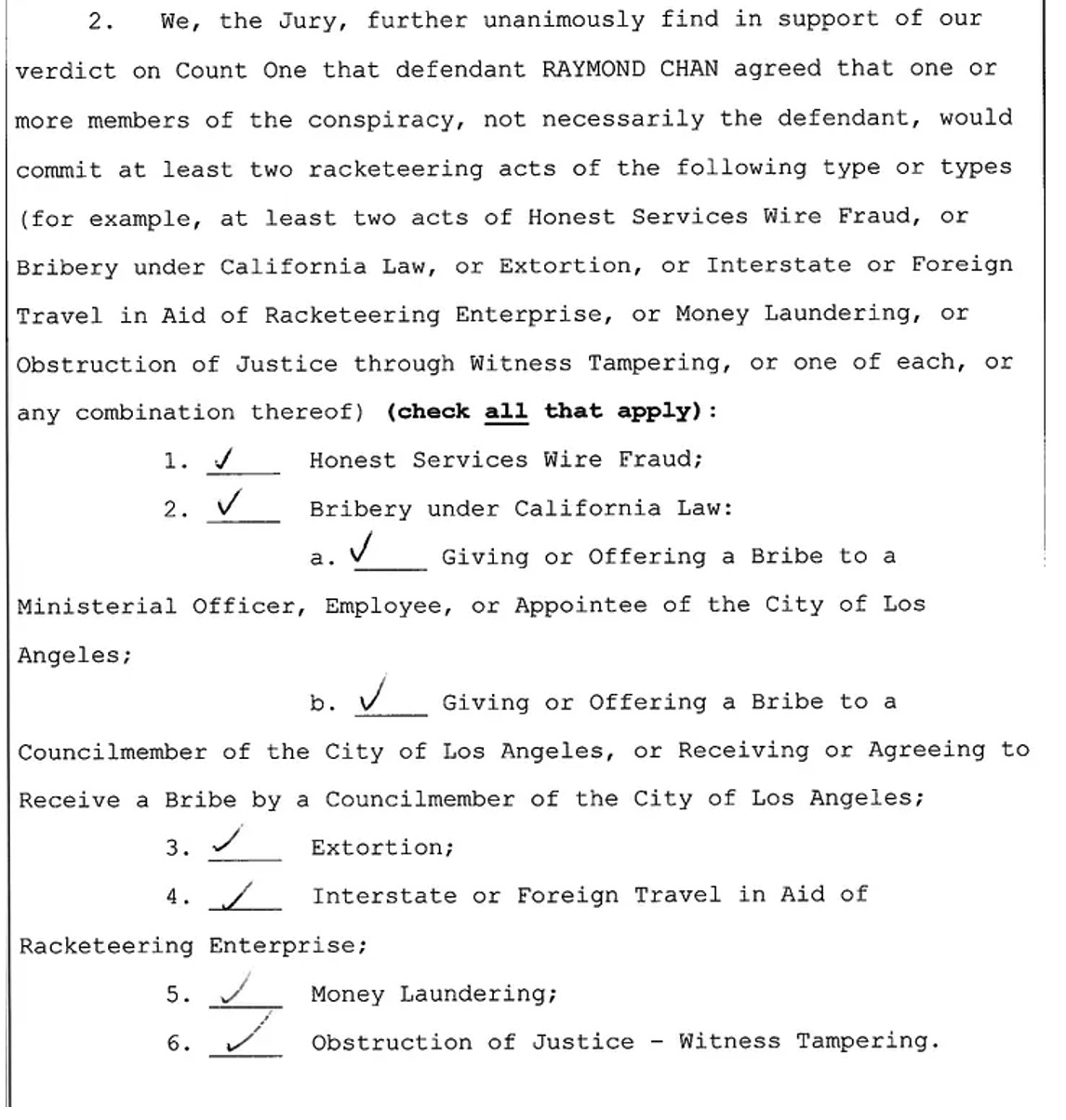
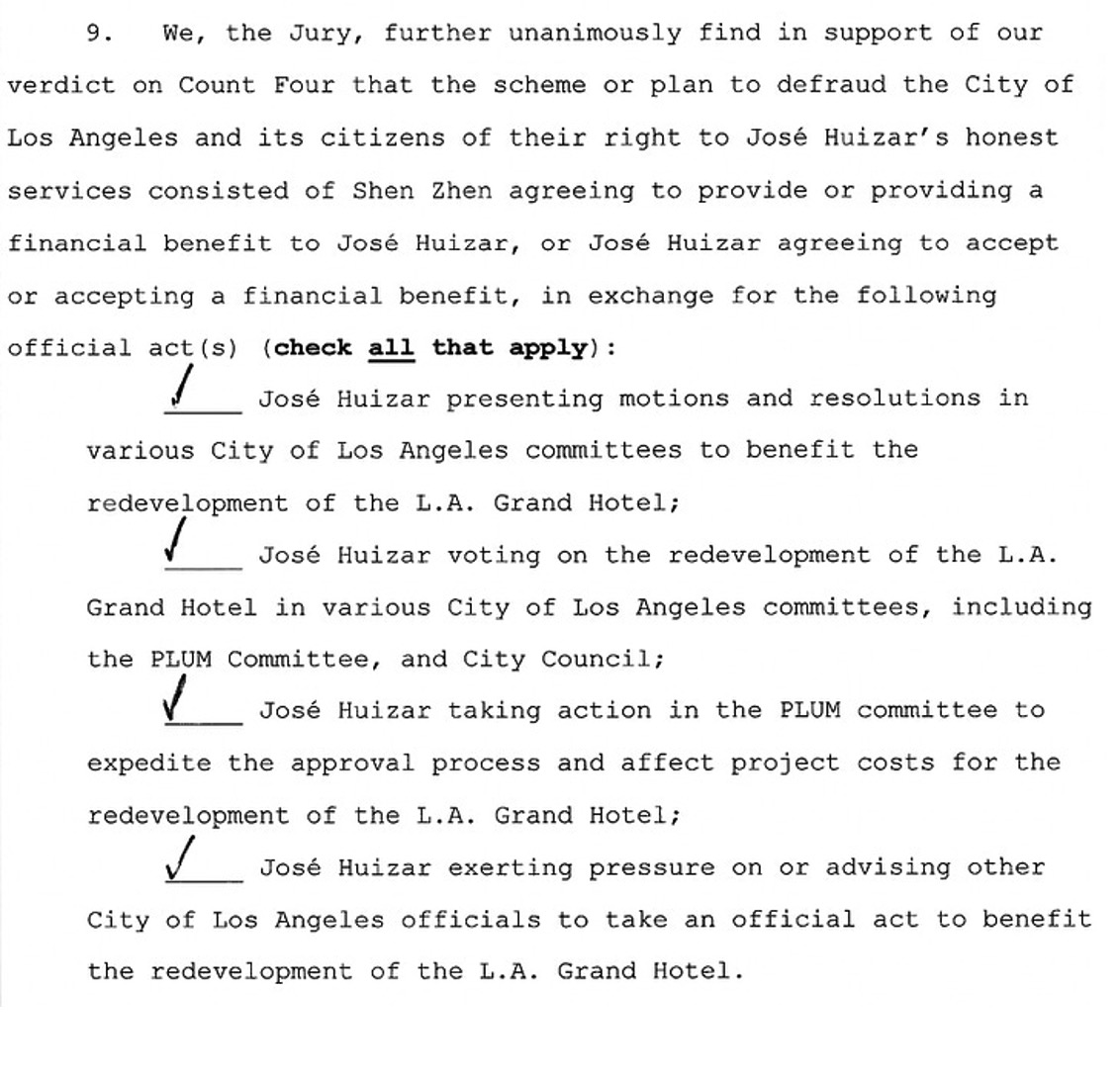
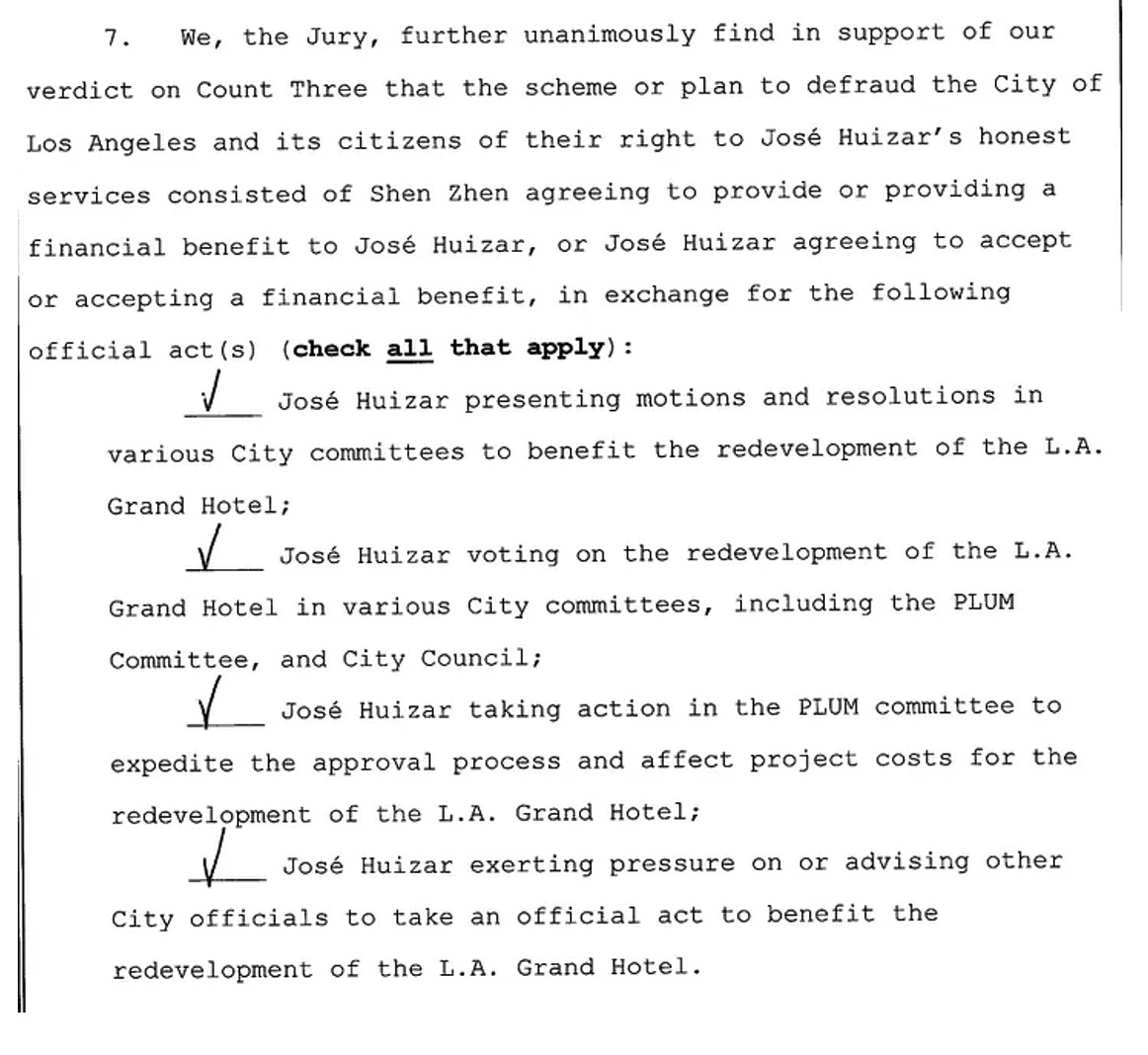
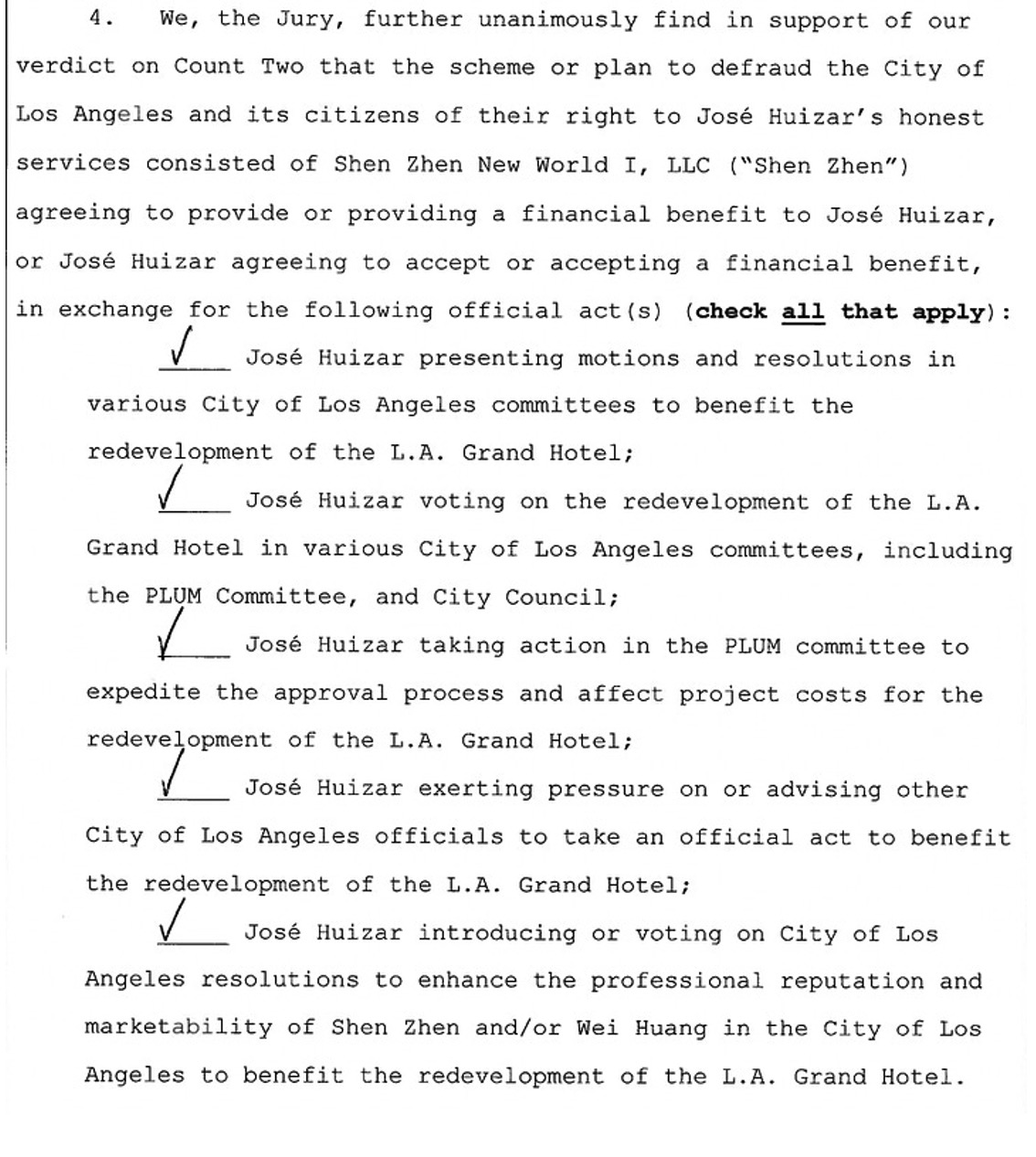
Chan is the first Los Angeles government official to be convicted by a jury of federal rackteering conspiracy; Huizar was the first to plead guilty.
The bribes included Chan helping secure $600,000 from current federal fugitive Wei Huang, the billionaire owner of the L.A. Grand Hotel and the Sheraton Universal Hotel, to settle a sexual harassment lawsuit filed by a former employee that Huizar feared would threaten his political career if allowed to fester. He also secured a $100,000 donation for Huizar’s wife’s City Council campaign from Shenzhen Hazens, owned by billionaire Fuer Yuan, and he accepted hundreds of thousands in bribes to try to grease the city approval process for Yuan’s redevelopment plan for the Luxe Hotel downtown.
Additionally, Chan used his position to secure money for a secret consulting company with real estate developer George Chiang that Chan planned to use after he retired from the city to, as Assistant U.S. Attorney Brian Faerstein said in his opening statement, “continue doing what he had always done, getting bribes for public officials to help advance his clients’ projects.”
It was Chan’s second trial. Last March, his original counsel, longtime Los Angeles lawyer Harland Braun, fell ill during trial, and Judge Walter eventually declared a mistrial. Before the first trial began, prosecutors upset about Brauns’s “increasingly unprofessional and bizarre personal attacks” filed emails with the court that included Braun stating in May 26, 2020, six months before Chan was indicted, “that Mr. Chan was preparing a written explanation of relevant facts and that he was interested in cooperating.”
He never did so. Freedman and Hanusz took over his defense after Braun’s illness, and they tried to present Chan to the second jury as a dedicated public servant whom prosecutors were trying to convict through guilt by association.
In his closing argument on Tuesday, Freedman said it’s “not a federal crime to violate the city’s ethics code” and said the case against Chan is the work of FBI Special Agent Andrew Civetti, who lead the investigation and is now in charge of all public corruption investigations in the Los Angeles area. He called the case “Agent Civetti’s fantasy land.”
“It’s Agent Civetti’s RICO conspiracy, we’re all just living in it,” Freedman said.
Prosecutors haven’t indicated how much time in prison they’ll recommend Judge Walter give Chan. The maximum sentence for rackteering conspiracy is 20 years.
A 2002 George W. Bush appointee, Walter last year sentenced David Lee, a private real estate developer who is a Bel Air multimillionaire, to six years in prison over a $500,000 bribe he paid Huizar, and for falsifying business records to try to conceal his crime. Lee surrendered to the Bureau of Prisons in January and is currently incarcerated at the prison in Lompac, which includes a minimum security camp. His release date is listed as Jan. 31, 2029.
The U.S. Department of Justice called the investigation into Huizar “Operation Casino Loyale” because it began when federal agents saw surveillance footage of Huizar gambling with Huang in Las Vegas and realized one was a government official and the other a wealthy developer. Chan never traveled to Vegas with Huizar and Huang, but witnesses testified he knew about the trips and was a key contact between Huizar, Huang and Feuer.
“The ‘Casino Loyale’ investigation has shined a light on the city of Los Angeles, and the FBI will continue to weed out corruption to ensure local government operates honestly to improve the lives of Angelenos,” Mehtab Syed, the acting assistant director in charge of the FBI’s Los Angeles office, said in a press release.
Freedman and Hanusz likely will file a motion for new trial that could delay Chan’s sentencing, and once Chan is sentenced, he won’t be taken into custody but will instead be ordered to report to prison by a certain date.
Reporter’s notebook:
I did not expect such a quick verdict, but it is not surprising that the jury was clearly repulsed by all this corruption. My previous article talks about some of the nepotistic hirings Chan influenced, and how his lawyers pointed out that recommending someone for a job isn’t a crime.
Of course that’s true, but the hirings were part of a larger pay-for-play scheme, and it’s important to remember that most people who are normal i.e. not politicos are repulsed by nepotism and other political corruption.
When I was at the Oregon Daily Emerald in college, my friend Jared learned that the student government’s faculty advisor was giving jobs to her husband and his friends that had been budgeted for students. She wasn’t federally indicted, but Jared wrote a big article about her scandalous behavior, and that year ended up being her final year as the student government’s faculty advisor. I remember driving him out to her house in Springfield, Oregon, so he could knock on her door and give her one final chance to comment before the article published. (I stayed in the car like his getaway driver.)
Nepotism was a big deal then, and I think the Chan jury showed us it’s a big deal now.
(Meghann Cuniff is an independent journalist who operates www.legalaffairsandtrials.com and watched most of Chan's two trials. You can find more coverage from her on her website.)















